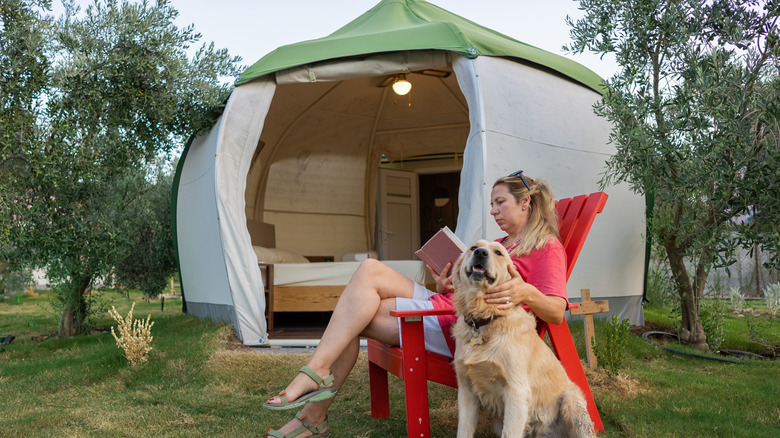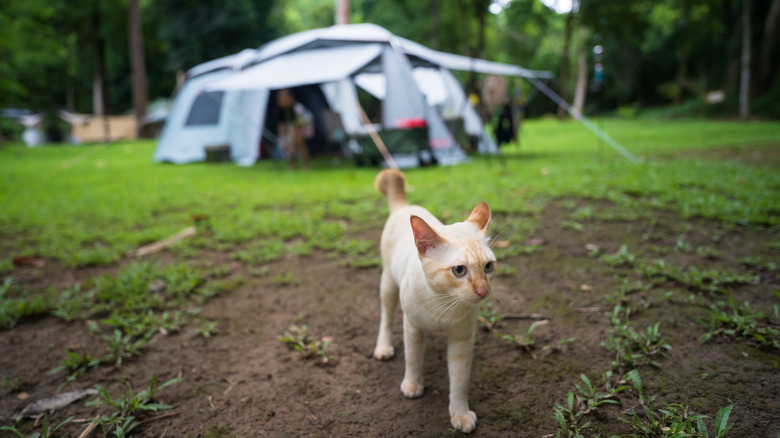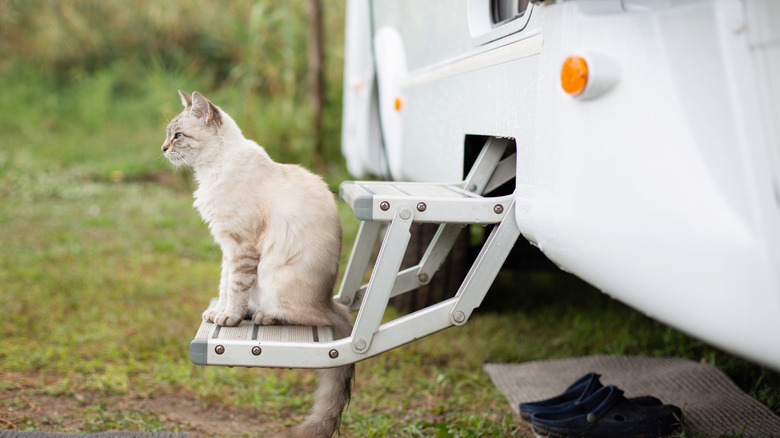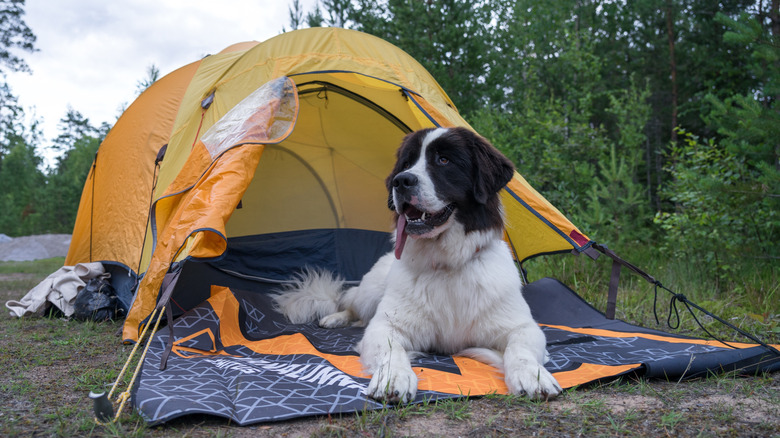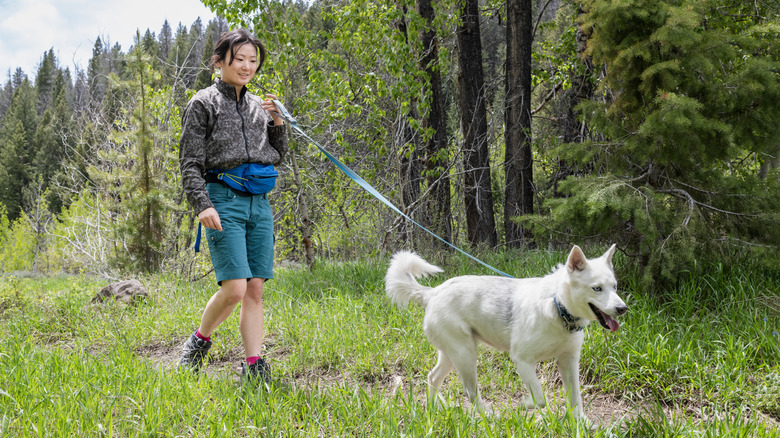How To Find Pet-Friendly Campgrounds (And What To Know About Them)
Much has changed since a fateful camping trip in 1903 when conservationist John Muir guided President Theodore Roosevelt through the Yosemite wilderness, sparking efforts that safeguarded the legacy of our national parks system. While their journey championed environmental preservation, today's campers are championing something else: a more inclusive way to enjoy the outdoors with their pets by their side.
Camping has experienced a remarkable resurgence in recent years. A 2024 KOA camping report found that seven in 10 U.S. households now identify as campers, up from 58% in 2014. Pet-friendly travel, in general, and camping, in particular, has grown in parallel, as people embrace ways to explore with their pets. Just imagine taking in the majesty of one of America's National Parks with your dog!
Before you begin, you'll need to pick the right campground that offers amenities tailored to your needs, pack essential gear, and plan for a seamless trip. Additionally, it's good to understand challenges like managing encounters, preparing for varying weather conditions, and ensuring your pet's safety and comfort throughout the journey. Camping can be the perfect dog-friendly outdoor activity beyond your morning walk to strengthen your bond while fully embracing the serenity of Mother Nature.
What makes a campground pet friendly?
Not all campgrounds are equally welcoming to pets, so it's important to identify those with pet-friendly options that cater specifically to your fur baby's needs. These campgrounds often feature specific rules, areas, and designated trails where pets are welcome. Many also provide added conveniences like shaded rest areas or pet washing stations, making outdoor adventures more comfortable for pets and their humans alike.
However, laissez-pet doesn't mean rule-free. Most campgrounds require pets to be leashed, along with other campsite rules. Other common rules include proof of vaccinations, such as rabies, to ensure the well-being of all visitors. Proximity to wildlife and emergency veterinary services is another crucial consideration, as some locations may pose risks like ticks, predators, or challenging terrain.
Campgrounds also vary in style and pet policies. Public sites, like those in national or state parks, often offer scenic settings but may have stricter rules. Private campgrounds are more likely to include specialized amenities like dog parks and pet-friendly cabins. For a more luxurious experience, glamping may provide high-end comforts, while beach and backcountry sites offer unique opportunities to explore nature — albeit with varying levels of preparation required.
Finding the purr-fect campground
Choosing the right campground is essential for a safe and enjoyable trip, especially with furry ones in tow. Online campground review platforms provide valuable insights from other pet owners about amenities, policies, and overall suitability. These tools help narrow your options and save time, allowing you to focus on campgrounds that align with your needs.
When choosing a pet-friendly camping experience, consider your skills and your pet's needs across different camping styles. RV camping with dogs or cats provides convenience for beginners, offering modern amenities like water hookups, electricity, and Wi-Fi, and many RV parks welcome pets with designated areas and walking trails. Developed campgrounds cater to families and first-time campers, featuring pet-friendly amenities such as dog parks, pet washing stations, and comfortable facilities, with on-site stores and planned activities adding extra convenience.
Luxury camping (glamping) offers upscale experiences with safari tents or yurts, sometimes including extra services for added comfort. Basic camping in national or state parks provides a traditional experience with tent pads and hiking trails, but be aware of stricter pet policies and review rules in advance. Backcountry camping suits adventurers seeking solitude, requiring self-sufficiency and preparation for rugged conditions and potential wildlife encounters. Beach camping allows pets to enjoy sand and surf, but check local leash requirements and access restrictions beforehand.
Packing essentials for a pet-friendly camping trip
Comfort and safety during a camping trip requires thoughtful preparation and the right gear. A checklist is your best friend. Start by assembling a first-aid kit containing bandages, antiseptic wipes, tweezers, and any medications your pet might need. Reflective collars or safety lights are indispensable for enhancing visibility during evening or early-morning walks, reducing the risk of accidents. Additionally, keep vaccination records handy, as some campgrounds may require proof of up-to-date shots upon check-in.
To provide comfort, pack an outdoor dog bed or sleeping bag for insulation and a familiar resting spot, especially during colder nights. Bringing along familiar toys can help alleviate anxiety by making the new environment feel more like home. Dog camping gear — such as portable food and water bowls — are essential for convenience and hydration, particularly if your adventures include long hikes or extended outdoor activities.
Health and environmental considerations are equally important. Before departing, protect your pet with flea and tick preventives, as these pests are common in many camping areas. Pack biodegradable (or more accurately, compostable) waste bags for responsible disposal of pet waste, helping to maintain a clean environment. Pet wipes are useful for managing smells or quick cleanups, while extra towels can handle muddy paws or unforeseen messes. Lastly, don't overlook often-forgotten items like a backup leash or extra pet food — small details that can make a significant difference.
Staying safe and respectful during your outdoor adventure
When camping with pets, it's especially important to follow trail etiquette, be considerate of fellow campers, and proactively manage potential hazards. Always keep your pet leashed on trails to prevent disturbances to wildlife and other visitors. Properly cleaning up after your pet and disposing of waste helps maintain the natural environment. Supervise your pet's interactions with others to avoid conflicts, and respect designated quiet hours to preserve a peaceful atmosphere for all.
Stay vigilant about environmental hazards like toxic plants, extreme outdoor temperatures (too hot or too cold for your dog or cat), and local wildlife. Regularly check your pet for ticks after hikes, and secure all food items to deter animals such as raccoons and bears from approaching your campsite. Moreover, embracing the Leave No Trace principle is crucial: This includes minimizing your pet's impact on the environment by staying on designated paths and properly managing all waste.
Overcoming common challenges when camping with pets
Even with thorough preparation, unexpected challenges can arise when camping with your pet. Effectively managing these hurdles requires situational attentiveness. One common issue is pet anxiety, especially in unfamiliar environments. To alleviate this, create a safe space at your campsite with their bed or a favorite toy. Calming aids, like anxiety vests for dogs and soothing sprays for cats, can help your pet relax. Maintaining familiar routines, such as feeding and walking at the usual times, also provides reassurance.
Weather is another unpredictable factor. Be prepared to adapt to sudden changes like unexpected rain or rising temperatures. Packing gear like rain covers, cooling vests, or extra blankets allows you to respond quickly to shifting conditions. Monitor your pet for signs of discomfort — panting, shivering, or restlessness — and adjust accordingly by providing shade, hydration, or warmth as needed.
Finally, recognize when adjustments or even an early end to the trip might be necessary. If your cat or dog shows signs of extreme stress, illness, or fatigue, prioritizing their well-being is key. With patience and preparation, camping with your pet can be an incredibly rewarding experience, offering moments of connection, joy, and discovery that make the effort worthwhile.
